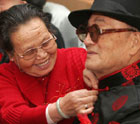BEIJING -- Foreign acquisitions of Chinese companies will be subject to stringent new checks intended to protect China's economic security under a new competition law passed on Thursday.
After 13 years on the drawing board, the Anti-Monopoly Law passed by the Standing Committee of the National People's Congress (NPC), China's top legislature, winning 150 out of the 153 votes, will come into effect on August 1, 2008.
"As well as anti-monopoly checks stipulated by this law, foreign mergers with acquisitions of domestic companies or foreign capital investing in domestic companies' operations in other forms should go through national security checks according to relevant laws and regulations if the cases are related to the issue," it reads.
Foreign companies have begun to acquire major state-owned enterprises or companies with famous brands, arousing concerns about economic security.
China has already established a basic national security check system for foreign mergers and acquisitions.
Foreign investors should apply for approval from the Ministry of Commerce (MOC) if their purchases of domestic companies affect national economic security, take place in key sectors or cause a transfer of the operating rights of famous domestic brands, according to a regulation issued by the MOC along with five other government organs last year.
Before that, only mergers and acquisitions worth more than US$100 million needed MOC checks and approvals.
The government will strengthen examination and supervision of foreign merger operations affecting major enterprises in sensitive sectors and issue policies to improve the system for admitting foreign-invested industries by the end of 2010, according to the National Development and Reform Commission (NDRC).
In December last year, the State Council, China's cabinet, released a list of strategic sectors in which the state would retain control.
The list included military-related manufacturing, power production and grids, petroleum, gas and petrochemicals, telecom manufacturing, coal, civil aviation and shipping.
Zhao Jinping, a researcher of the Development Research Center of the State Council, said the implementation of the law would have no effect on normal foreign investment and purchases.
He said the two documents issued by the MOC and NDRC, aiming to restrict malicious foreign purchases, were not a signal for China to limit foreign direct investment.
"A mature market protected by laws and regulations will enhance the foreign investors' confidence in China's economic development prospect," Zhao said.
Mei Xinyu, a researcher of the Chinese Academy of International Trade and Economic Cooperation, said legislation on foreign merger would affect foreign companies taking advantage of legal loopholes, but not affect law-abiding companies.
New policies imposed on foreign companies did not curb foreign investment. The number of companies with total foreign investment over US$10 million rose by 2,095 to 38,000 in June from the end of last year.
The law, with eight chapters and 57 provisions, also bans monopolistic arrangements, such as cartels and other forms of collusion, and provides for the investigation and prosecution of monopolistic practices, while protecting monopolistic arrangements that promote innovation and technological advancement.
It prohibits monopolies from using their dominant status in the market to curb competition, fix prices, enforce package sales, and refuse or enforce trade.
All companies seeking mergers or acquisitions would have to notify the anti-monopoly law enforcement departments if the actions meet the standard set by the State Council.
The law states that "an anti-monopoly commission will be set up under the State Council to deal with anti-monopoly issues." The commission will appoint departments to undertake enforcement.
The law stipulates "officials of the law enforcement departments will be prosecuted if they leak confidential trade information acquired during investigation", to protect the interest of companies.
The law also stipulates that "government departments should not take advantage of their power to curb competition", and prohibits governments from appointing producers or suppliers for unit or individual procurement.
The law bans trade associations from organizing companies in their own industries to take monopolistic actions prohibited by this law.
"Those who violate the provision will be fined up to 500,000 yuan (about US$66,700), and the associations with serious offences will be deprived of their registrations," the law stipulates.
The provision was added during the third reading of the anti-monopoly law. Late last month, the prices of instant noodles were hiked by about 10 percent, which was coordinated by the instant noodles trade association.
Yan Jinhu, member of the NPC Standing Committee, said the behavior caused panic in the society as many residents rushed to supermarkets for purchase of instant noodles.
Other members also agreed to add the provision into the law after having a heated discussion over the issue.
China joins more than 80 countries in adopting an anti-monopoly law. Drafting of the law began in 1994.
Experts said China's socialist market economy had matured in the last decade, and the current market circumstances made the introduction of an anti-monopoly law imperative.











